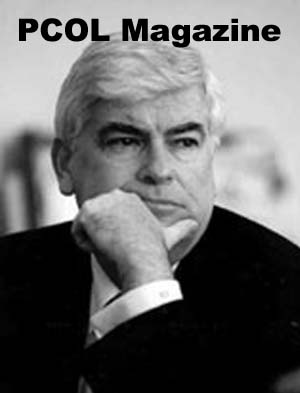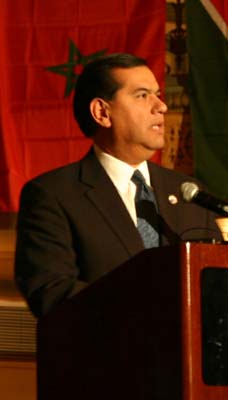
"Literally hundreds of thousands of people, in direct and indirect ways, have made a significant contribution to this organization. I served with volunteers who lost their lives during the term of their service. Yet despite that, and the efforts maybe in some countries to designate certain places or areas in memory of these individuals, we have kept it sort of as a nameless organization in that sense. I hope people understand that when this proposal was made--and I respect the fact that these things can happen--no one came and asked me what I thought about whether or not we ought to name this building after one particular individual. Had I been asked about it prior to this decision to move forward with it--regardless of who had come forward with any particular name--I would have expressed the same reservation. This has nothing to do with my deep respect for Paul Coverdell. As the majority leader pointed out, I gave a heartfelt set of remarks at the time of his passing, so I feel somewhat awkward in even standing up and talking about this. But we have to be far more judicious, and careful not to race down and offer resolutions to put names on buildings in this community and elsewhere without thinking through what the implications are. "
Senator Chris Dodd's opposes renaming Washington national headquarters of the Peace Corps as the Paul D. Coverdell Peace Corps Headquarters
[Congressional Record: February 15, 2001 (Senate)] [Page S1530-S1532] From the Congressional Record Online via GPO Access [wais.access.gpo.gov] [DOCID:cr15fe01-58]
PAUL D. COVERDELL
Mr. DODD. Mr. President, we have just adopted a resolution offered by the majority leader and others that will honor our former colleague, Paul Coverdell of Georgia, for his service as a Member of this body, as a member of the political life of the State of Georgia, and as a Director of the U.S. Peace Corps.
This resolution, among other things, would name the Washington national headquarters of the Peace Corps as the Paul D. Coverdell Peace Corps Headquarters.
The bill would also authorize $10 million in appropriations to give an award to the University of Georgia to support the construction of the Paul D. Coverdell Building at the Institute of Biomedical and Health Sciences at the University of Georgia.
The legislation to honor our former colleague, in addition to what was done last year--when we enacted the Paul D. Coverdell Worldwide School Act of 2000--would designate the Worldwide Schools Program as the Paul D. Coverdell Worldwide Schools Program that was begun by Senator Coverdell when he was Director of the Peace Corps. Last year's action was a fitting one by this Congress to honor our former colleague and is an appropriate tribute which recognizes the special contribution Paul Coverdell made to the Peace Corps during his tenure as its Director. I strongly and enthusiastically supported its enactment.
Let me, first of all, say there is a particular reason I speak on this particular issue, in addition to my affection for Paul Coverdell and the years I spent working with him.
As I mentioned a moment ago in the colloquy with the distinguished majority leader, some 33 years ago, after I finished college, I served as a Peace Corps volunteer in the Dominican Republic not far from the Haitian border for 2\1/2\ years in the mountains. I worked with 22 communities and some 11,000 people in the northwest region of that country. It was an important period of maturation in my life. I learned a great deal about myself and have a deeper appreciation of my own country.
Serving outside of the United States and seeing the shortcomings of other nations, one appreciates in many ways unimaginable as a U.S. citizen, how fortunate we are to live in this great country with 200 years of strong democracy and freedoms and opportunities that the world envisions. One also comes away with a deeper appreciation of other cultures and other peoples. It was a wonderful experience. I have often said that next to my family and the circumstances of growing up in a strong, healthy household with five siblings and wonderful parents, no other event in my life was as significant as these years as a Peace Corps volunteer--as a part of growing up and learning more about myself, sparking, in many ways, a determination to be a part of public life. And that has occurred over the years since my arrival in the House of Representatives as the first former Peace Corps volunteer to be elected to the Congress, along with Paul Tsongas that year, a blessed memory. And then I arrived in the Senate, along with Paul Tsongas, 2 years after his arrival, as Peace Corps volunteers here. Today I am the only returning volunteer.
I sometimes like to have some fun with my colleague from West Virginia, Mr. Rockefeller, the junior Senator from West Virginia, who was a staff member of the Peace Corps. But we make a significant distinction between staff members and volunteers. The 161,000 Americans who are former Peace Corps volunteers will appreciate that distinction. There are deeply emotional and strong feelings that I have about this organization and the contribution that it has made to our Nation and to millions of people all over the globe.
This was an idea that was born in a speech given by another Senator in the State of Michigan as he was running for President in 1960. His name was John Fitzgerald Kennedy. He said, on the steps of the University of Michigan, that he had an idea where Americans of all ages might take a period out of their lives to serve the needs of others around the globe. It was an idea that Hubert Humphrey had talked about as a Senator--not specifically the Peace Corps, but he had raised the idea of Americans serving the interests of others around the globe. Then, over the years, beginning with the remarkable leadership of Sargent Shriver as the first Director of the Peace Corps, there have been 14 other Directors over 40 years. Most remarkably, there was one directorship under Loret Ruppe, the wife of a former Republican House Member, who I served with for 8 years under the Reagan years. She led the Peace Corps in a most magnificent way. In fact, I remember she even forwent some of her salary initially because she did not feel she understood the Peace Corps well enough to take a salary. That is how dedicated she was to this organization.
But over the years, we have talked about the Peace Corps not as John Kennedy's Peace Corps or Hubert Humphrey's Peace Corps or Sargent Shriver's Peace Corps or Loret Ruppe's Peace Corps or my Peace Corps; it has been the Nation's. It just says: The Peace Corps. There is one room at the Peace Corps named for Sargent Shriver, but that is the only facility I know of that has a name on it at all, because we never thought it belonged to any particular person.
Literally hundreds of thousands of people, in direct and indirect ways, have made a significant contribution to this organization. I served with volunteers who lost their lives during the term of their service. Yet despite that, and the efforts maybe in some countries to designate certain places or areas in memory of these individuals, we have kept it sort of as a nameless organization in that sense. I hope people understand that when this proposal was made--and I respect the fact that these things can happen--no one came and asked me what I thought about whether or not we ought to name this building after one particular individual. Had I been asked about it prior to this decision to move forward with it--regardless of who had come forward with any particular name--I would have expressed the same reservation. This has nothing to do with my deep respect for Paul Coverdell. As the majority leader pointed out, I gave a heartfelt set of remarks at the time of his passing, so I feel somewhat awkward in even standing up and talking about this. But we have to be far more judicious, and careful not to race down and offer resolutions to put names on buildings in this community and elsewhere without thinking through what the implications are.
For those who have served well, brought honor to institutions, to try to race ahead with one name over another does not serve this country well, does not serve its institutions well. I was asked to be the co-chairman of a bipartisan group last year to choose two Senators' portraits to be painted on two ovals outside this Chamber in the reception area. Slade Gorton from the State of Washington was the other member of this two-member commission. We made selections after deep discussions with the Senate historian and with other Members. In fact, I remember having a conversation with the distinguished former minority-majority leader, Senator Byrd of West Virginia, about his ideas.
We went to our respective caucuses, shared these ideas, and, finally, after having vented the entire process, came to the Chamber with the suggestions of Senator Vandenberg and Senator Wagner of New York to be the two suggestions. But we went through the process even before we decided to put the portraits of the two Senators high up on the wall of the reception area.
I would urge my colleagues, aside from this particular set of circumstances, that rather than trying to compete with one another as to whether or not we are going to have a Republican or a Democrat or some particular name on a building, that we slow down, think, and be more careful about how we proceed on these matters. That was the motivation, more than anything else, that caused me to object yesterday to this resolution going forward, the concerns I had about the naming process, in this particular resolution. So in no way does my lack of enthusiasm for this resolution, which is before us and which has just been adopted, suggest a criticism of Paul Coverdell's tenure at the Peace Corps. In fact, he was a very fine Director of the Peace Corps, who made a number of contributions to the organization, including the establishment, as we already heard, of the Worldwide Schools Program, and the dispatching of volunteers, for the first time, to Hungary and Poland.
As I said, there were also 14 other Directors of the Peace Corps who made significant contributions. Paul was not the Peace Corps's first Director. As I mentioned, Sargent Shriver was the first Director, who gave the organization the kind of direction and definition it needed at the outset and during his entire tenure. Loret Ruppe, who I mentioned, holds the honor of having served as the longest Director of the Peace Corps, which was during the 8 years of the Reagan administration. I respected Paul Coverdell enormously. I worked closely with him on Peace Corps issues when he was the Director between 1989 and 1991. I actually chaired his confirmation hearings before the Senate Foreign Relations Committee.
He and I continued to work together on Peace Corps matters when he joined the Senate in 1993, and served, as he did then, as the ranking member. I was then chairman of the subcommittee having jurisdiction over the Peace Corps. Whenever he would discuss any legislation related to the Peace Corps, the first thing Paul Coverdell would ask was, is it good for the Peace Corps? Is it going to create problems? Is it going to fracture the bipartisan consensus that has existed for 40 years with respect to this organization?
Paul always put the interests of the organization, and particularly the volunteers, first. I believe we should do so as well. That is our responsibility, in my view.
This year the Peace Corps will celebrate its 40th anniversary since being established by President Kennedy in 1961. The Peace Corps stands as a living embodiment of the well-remembered challenge that President Kennedy posed to all Americans more than four decades ago: It is not what your country can do for you but, rather, what you can do for your Nation.
The Peace Corps was first established by Executive order during the early days of the Kennedy administration. Sargent Shriver was named as its first Director. Soon thereafter Congress enacted legislation to codify it into law.
The legislation is quite simple. It set forth three goals for the organization: to help the people of interested nations in meeting their need for trained men and women, to help promote a better understanding of Americans on the part of peoples served, and to help promote a better understanding of other peoples on the part of Americans.
As the first Director of the Peace Corps, Sargent Shriver confronted the special challenge of transforming President Kennedy's challenge to America's young adults into an operation program that would meet the three goals established by this organization.
During the 5 years of his tenure as Director, Sargent Shriver gave form to the dream of voluntary service. The 14 Directors who followed in his footsteps benefitted from the foundation that he had established for the organization. However, each succeeding Director, in his or her own way, has also made significant contributions, which has kept the Peace Corps strong and vibrant over these past 40 years.
The heart and soul of the organization, however, is not the Directors of the Peace Corps, or the Peace Corps staff in Washington, or the buildings; it is the volunteers--past, present, and future. Over the past 40 years, more than 161,000 Americans, young and old, men and women, have given up at least 2 years of their lives in service to our Nation, and in far flung corners of the world. I was privileged, as I said at the outset of these remarks, to be one of those volunteers.
Peace Corps volunteers have served in 130 nations, working to bring clean water to communities, teaching their children, helping start small businesses, and more recently joining in the international efforts to stop the spread of AIDS.
Today, there are more than 7,000 volunteers serving in 76 nations, working to put a living face on America for those people in developing countries who might never otherwise have any contact with America or her values. Through the Peace Corps, the United States has shared its most valuable resource in the promotion of peace and development--its people. That is our greatest resource, and volunteers are the very embodiment of our best values.
The men and women who have served and answered the call of the Peace Corps reflect the rich diversity of our Nation, but they have one thing in common; namely, a common spirit of service, of dedication, and of idealism. We should not let politics or partisan bickering ever in any way diminish that spirit. Let us continue to respect the unique nature of the Peace Corps and show deference to the tens of thousands of volunteers who have given their time to make the Peace Corps the internationally respected organization that it is today. It is more than one director. It is more than any one volunteer. In fact, the sum total of the Peace Corps is larger than all of its parts. That is why we should not try to embody the spirit of the organization by placing one of its elements above the others.
For those reasons, I raised the objections and the reservations about this resolution. I withdrew those reservations in the spirit of cooperation, knowing it is important that the Peace Corps not be embroiled in this kind of battle.
I hope in the future more patience will be demonstrated, more consultation involved, before we move ahead at the pace we did with this particular proposal. My respect and admiration to Paul and his family, to his wife, and to his staff and others who have worked with him over the years. Please understand that my objections raised here today, my reservations raised here today, have nothing whatsoever to do with my deep admiration for him, his work as Senator, or his work as Director of the Peace Corps during his 2 years of service.
I thank my colleague from West Virginia and yield the floor.





















